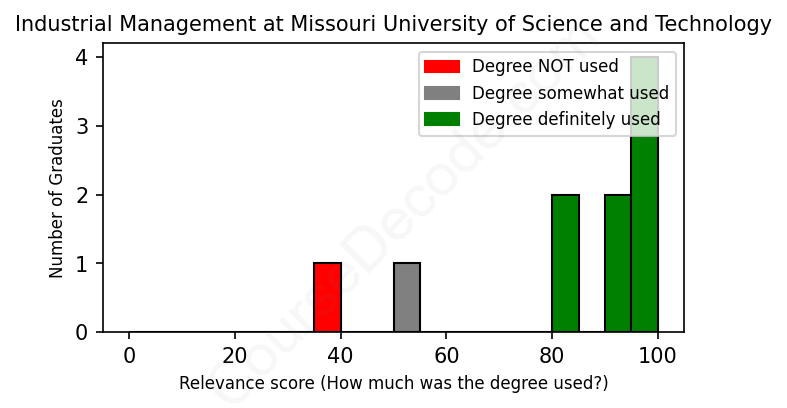
First, some facts. Of the Industrial Management graduates from Missouri University of Science and Technology we've analyzed , here's how many have used (or NOT used) their degree in their career:

These are estimates based on AI analysis of 10 LinkedIn profiles (see below).
The verdict? Significantly above average. Overall, with an average relevance score of 83%, Industrial Management graduates from Missouri University of Science and Technology have a much higher likelihood (+16%) of finding work in this field compared to the average graduate across all fields:
And for comparison, here's the chart for all profiles we've looked at across all degrees.
Also, after graduating, only 20% of these graduates have pursued further education other than another Bachelor's degree (such as a Masters degree or other), compared to the average across all profiles of 35%. This suggests a Bachelors degree is enough for most Industrial Management graduates, and it's normal to look for work straight after graduation.
See the details:
|
Relevance score: 50% We think this person has gone into a career only somewhat relevant to their degree. We think this person has gone into a career only somewhat relevant to their degree.
DEGREE INFOGraduated in 2016 from Missouri University of Science and Technology with a Bachelor of Science (B.S.) in Industrial Management. No other secondary education since. JOB HISTORY SINCE GRADUATIONProject Engineer Documentation Specialist Weir Minerals Lewis Pumps Mar 2017 - Present ABOUTNo information provided. |
The top 10 most common jobs done by the graduates we've analyzed (ranked most common to least) are:
Based on the LinkedIn profiles analyzed, the most common jobs held by graduates of the Industrial Management program at Missouri University of Science and Technology revolve around product management, supply chain management, and various engineering roles. Many graduates have positioned themselves in roles like Associate Product Manager or different levels of supply chain leaders at companies like PepsiCo and Workday. These positions require a solid understanding of product lifecycle, operational efficiency, and strategic decision-making, all of which are integral parts of the Industrial Management curriculum. It's clear that a significant number of alumni are capitalizing on the specific skill sets and knowledge they acquired during their studies to land roles that not only pay well but also align closely with their training.
When it comes to the relevance of these jobs to Industrial Management, the majority appear to have a strong connection. Most roles in product management directly utilize the principles taught in the degree, emphasizing product development and strategy. Similarly, positions related to supply chain, such as the various leadership roles at PepsiCo, showcase a direct application of supply chain management skills and theories. While there are a few outliers—like editorial and some engineering jobs—that don't align perfectly with the core aspects of Industrial Management, overall, graduates are finding opportunities that not only leverage their expertise but also reflect the value of their degree in the job market. So, if you’re considering a path in Industrial Management, it looks like a solid degree choice with plenty of relevant career options!
Here is a visual representation of the most common words in job titles for Industrial Management graduates (this is across all Industrial Management graduates we've analyzed, not just those who went to Missouri University of Science and Technology):

Graduates from the Missouri University of Science and Technology with a degree in Industrial Management have generally carved out promising career paths. For many, their first jobs after graduation tend to revolve around roles in product management, supply chain, and engineering, often with reputable companies like Workday, PepsiCo, and Emerson. These entry-level positions provide a solid foundation, allowing graduates to gain practical experience and further hone their skills. As they gain experience, it's common for these individuals to quickly move up the ranks, transitioning from positions like product manager or supply chain leader to more senior roles, such as senior associate product manager or processing department manager, within just a few years of starting their careers.
Looking further down the line, about 5 to 10 years post-graduation, you can see that many of these graduates are not only staying in relevant fields but also taking on significant responsibilities. Roles like manager of profit planning, senior data product manager, and various engineering leadership positions highlight a strong alignment with their educational background. While a few may have taken more unconventional paths—like self-employment or switching industries—the majority appear to be thriving in careers that fully utilize their Industrial Management training. Overall, it seems like a rewarding trajectory for those entering this field, with ample opportunities for growth and advancement!
Honestly, a Bachelor’s degree in Industrial Management can be pretty challenging, but it really depends on your interests and strengths. At Missouri University of Science and Technology, you'll encounter a mix of engineering, business, and management courses, which can get pretty technical. If you're good with numbers and enjoy problem-solving, you'll likely find the coursework manageable. That said, it might be a bit tougher than some other degrees because it requires both analytical thinking and practical application. So, if you dive in with a positive attitude and a bit of determination, you’ll likely find it rewarding as you learn to juggle those different concepts. Overall, it’s a solid balance of hard work and interesting material, but definitely not the easiest path out there!
Most commonly, in the LinkedIn profiles we've looked at, it takes people 5 years to finish a Bachelor degree in Industrial Management.
Based on the LinkedIn profiles you provided, it seems like most of these Industrial Management grads are doing pretty well for themselves, especially considering they graduated in the last few years and jumped into solid roles right away. Many of them started out as interns or in entry-level positions but quickly climbed into managerial or specialist roles, which typically come with decent salaries. For instance, positions like Product Manager and Supply Chain Leader at big companies like Workday and PepsiCo usually offer competitive pay. Even the more recent grads have quickly transitioned to supervisory roles, which suggest they’re on the right track financially. Overall, it looks like they’ve landed in opportunities that likely pay well, especially for recent graduates!
Here is a visual representation of the most common words seen in the "about" section of LinkedIn profiles who have a Bachelor degree in Industrial Management (this is across all Industrial Management graduates we've analyzed, not just those who went to Missouri University of Science and Technology). This may or may not be useful:

Here are all colleges offering a Bachelor degree in Industrial Management (ordered by the average relevance score of their Industrial Management graduates, best to worst) where we have analyzed at least 10 of their graduates:
| College | Score | Count |
|---|---|---|
 Missouri University of Science and Technology Missouri University of Science and Technology
|
83 | 10 |